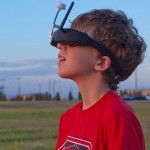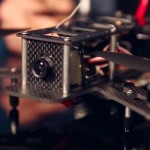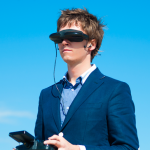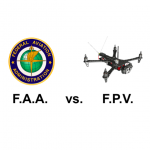FPV
-

Best FPV Goggles & Gadgets (Updated Holidays 2019) Killer FPV Drones & Systems Guide!
Updated: November 18, 2019 An FPV system (First Person View) is a unique addictive and almost surreal flying experience! After years ...
Read More -

Tanky Launches 100mph Ready-to-Fly FPV Racer
Crowdfunding sites like Kickstarter and IndieGoGo are often a good barometer of what's coming next in the drone industry. Projects looking ...
Read More -

FPV Drone Racing – The UAV Sport about to Hit the Big Time
For a while now the drone industry has been threatening to move out of the shadows and into the mainstream. People are beginning to see the ...
Read More -

How-to Build a DIY Racing Drone – Racing Quadcopters
If you have seen the amazing Star Wars Inspired Drone Race post which was one the most popular ones on the site this year, you know what ...
Read More -

DJI Phantom 2 FPV Setup With Zenmuse Gimbal
We have received quite a few requests from you guys about how to set up an FPV system on quadcopters. Our previous content covers many ...
Read More -

FAA v. FPV: Exclusive Interview With Raphael “Trappy” Pirker
A somewhat unexpected NTSB appeals board ruling was announced last week, not long after an FAA official commented that ruling on drone flights should be expected by the end of the year. Today, further speculation emerged in a post by Marketwatch citing a Wall Street Journal article that expects that the "looming rule proposal would restrict commercial uses, require pilot license".
According to the WSJ article referring to "people familiar with the rule-making process", the FAA plans to group all drones weighing less than 55 pounds under one set of rules. That would dash hopes for looser rules on the smallest drones, such as the 2.8-pound Phantom line of camera-equipped, four-rotor helicopters made by China’s SZ DJI Technology Co. Similar-sized devices are seen as the most commercially viable drones and have surged in popularity in the last two years.
Manned Flight Training For Unmanned Licenses?
But the really scary bit only comes next. WSJ also speculates that pilot certifications likely to be proposed by the FAA would typically require dozens of hours flying manned aircraft. What now? We would have to fly planes in order obtain a license for a quadcopter weighing 2.8 pounds? Doesn't that sound like having to take drivers lessons on real cars in order to be able to play with remote controlled cars? I suggest we keep calm for now and wait for regulations to be announced formally because these speculations (which hopefully they are) seem to be just preparing the public for the worst, so the effective regulation goes into effect with less outrage.
Huerta v. Pirker
As the US is increasingly becoming a hotbed of controversy over the long awaited regulation, a particular case gets all the attention as the one many expect to set precedent for future drone regulation. At the same time, I am not sure that the Huerta (FAA) v. Pirker case should be viewed as the one shaping whether drone flights will be legal in the future. Specially since according to our opinion here at Dronethusiast (and Pirker also, read more below) this case is really just at the beginning and each side took one hit. Also, let's not forget that the case is about Trappy's $10.000 fine. It is not a lawsuit between the drone community and the FAA. In case you have missed the details of the legal saga and the rulings so far, we have covered it here and you can read all the related legal documents on the NTSB sight here.
Raphael Trappy Pirker's Side of the Story
 Raphael "Trappy" Pirker
Raphael "Trappy" PirkerAfter the NTSB ruling, we have covered the story and went on to try to provide some background information on Trappy. Unsurprisingly, the comments on our posts here on the site and in social platforms have been extremely polarized. Some of you thought that Trappy is a hero and he is fighting his case for the entire drone community. Others saw Pirker as the main reason of the controversy and the looming fear that our hobby could be outright banned. So we reached out to Trappy and asked for an exclusive interview to hear his side of the story. We wanted to ask you all the questions we thought you guys had on your mind and also wanted to clear up claims that emerged in the posts.
Dronethusiat (DT): Reading the comments by people in social platforms and our sight, we see that some people think you that you are a hero fighting for their rights to fly, while others are on the opinion that you are doing everything to ruin their hobby. What are your thoughts on this?
Trappy: It's pretty troubling to see that people take the stands of defending the FAA in this case and kind of try to blame TBS (Team Black Sheep, Trappy's company) for stirring the pot. All of the legal frameworks that were used to fine me were put in place way before TBS even existed, before we even flew FPV. The policy statements that they are using to fine us were written in to 2007, so and the first FPV flight happened somewhere around late 2008. I don't know, but it just took the FAA to find somebody that they wanted to fine and there isn't any new kind of law that was created as a reaction to any of our flights.
DT: Maybe this was just the right time for them being able to find the right scapegoat or in this case a "scapesheep" :).
Trappy: Yeah, we were at the forefront of the whole FPV movement, so any heat that was going to come towards FPV was going towards us. And this happened in many instances and in many countries as well. We kind of became legal test cases and in the US, we just thought that the allegations were ridiculous enough to justify defense and we defended against them pretty successfully in the first instance. Now we've lost on the appeal, but what people need to understand is we've just now gotten to the point that the actual fine can be discussed. Our initial defense was that we tried to get the entire case thrown out by the merits of the law, based on that there were no existing laws in place to actually fine any drone operator. This has been overturned by the NTSB ruling, so now this case going to go into a court where we are actually going to discuss how reckless the flight was and what fine would be justified for it.
DT: Before we get into how reckless the flight was, can I ask you something? Could you have just walked away from the fine flipping the fingers at the US authorities as you are a Swiss citizen living in Austria?
Trappy: Yes, the FAA has no jurisdiction over where I am right now, nor does it have any jurisdiction in Switzerland or Austria. That would have been the most easy way out saying: Yeah, fine me whatever you want. We can add a zero to the number, it doesn't matter because they can't collect the fine anyway. The second easiest one would have been based on the fact that I was a student back than and I didn't make any money. I actually had an offer on hand to get the fine severely reduced just based on the merits of me not having any money and usually governments do not have the right to collect fines on non-criminal charges that would bankrupt the person. At least this is the case here in Europe. So based on the amount of money I had on my bank account, the fine would have been maybe two or three meals at Mc Donald's. I just thought that this is something that we should just not bow down to because it is one of the most influential aviation agencies in the world and they seem to be hell bent on preventing what I like to call drone democratization. So it's more about giving it to the people for commercial benefit or for just pleasure and they seem to be hell bent on preventing that. So I think it was a just cause to fight.
DT: So do you think that they don't want people to fly drones for hobby or even more so for commercial purposes because there is just too much money in it and they want to make sure that they control access to it? Is the kind of usual political lobby thing?
Trappy: There is definitely politics involved. I don't want to say that the FAA is financially motivated because I don't think that the people empowered there would benefit from this. I think it's more like a who owns the skies or who gets to say what happens kind of thing. It's just an authority thing. If you were the person in charge of the airspace and everything that flies in it, you want to have a lot more power that encompasses drones as well. Especially when seeing that drones will be more and more prevalent in the future.
DT: So this could work in a similar way as in big corporations, they might just trying everything to save their jobs, right?
Trappy: Yeah, exactly. In fact a lot of people ask us why we never ask for permission for our flights. That's basic psychology. If was in charge of making that call, I would never allow any kind of flight because what do I personally have to gain by allowing somebody else to fly. Not just over people, but anywhere for that matter. There is always a risk involved, so why should I say yes. So the answer is always going to be no. We tried that many times and answers was always no, so asking for permission is not going to get you anywhere with a technology that is not really regulated or is not very well understood at the moment.
DT: An important question that leads us towards the reckless flight situation. Are you a crazy tycoon that just does these stunts to promote his own company?
Trappy: I wis that was the case. We do fairly well with TBS and we operate a fairly large drone manufacturer, but this is just me taking some time of going to some place and having fun with what I like doing and what I like doing just happens to be my job as well.
In the case of the Virginia flight it was a totally different case. I was a student back then and hese guys asked me to do a flight for them at the University of Virginia so they could use the footage to make a marketing video. So back then I was not involved in the whole manufacturing of the drones. The aircraft was a TBS Zephyr or at least a prototype of it and the company did not exist back then and everything I did was paid for by my own money. The money that I made on the flight in Virginia went straight back into better motors or batteries. That was the life I lived back then. I was a student at the University of Zürich and I had a side job, but really not that much money. Nowadays it's a little bit different, we don't fly first class but at least we can afford economy class tickets to just about anywhere we want to go and want to fly. Whenever we do have time, we love to go out and just shoot great videos from around the world. Of course it's also a kind of promotion for our business, but we don't do that with this in mind. We go there and if there is no good video comes out of than it's not a big deal.
DT: This is the other thing that a lot of people mentioned, the fact that you actually got paid to shoot that video. What kind of promotion was it?
Trappy: The idea was to shoot a promotional video for the Medical Campus of the University of Virginia. It was done by an advertising firm that was right up my alley, so they fully understood what we were doing and the kind of thrills from doing fast flights on closed obstacle courses and the near misses. They were after the visuals and I don't think I could have done the flight if it was not for hire. It requires permission from the people on the ground, we had contact with air traffic control. Every hospital has a helipad, so we had to have clearance from them to take of and land for every flight that we did. We also had to be in touch with campus police and they were blocking off roads whenever possible. So all of this was only possible because it was a paid job and not a gig for hobbyist purposes. If you went there asked for a permission to all this for your own personal pleasure, they would not have allowed it.
DT: So it was a controlled situation? For example when the guy who had to duck in front of the aircraft when it enters the roundabout was expecting it to come?
Trappy: If you look at the video, you can see that he is actually jumping at the plane trying to catch it. Because the space was very limited, what we tried to do is a catch landing. He was so surprised about how the aircraft came in so he kind of misjudged his jump and at that point I realized that is not going to catch it, so the safest things was to just let it fly into the bushes behind. It's just a foam airplane, and the guy was one of my three spotters so nothing really happened.
DT: Does the youtube video play at regular speed and how reckless do you think the flight was among the circumstances?
Trappy: The video plays at regular speed, we did not speed it up. As to the recklessness of the shoot, I don't think it was reckless at all, otherwise I would not have contested the fine. If you want to look at from the danger point of view, I don't think anyone around the aircraft or in the air were in danger. I was very well trained and we spent many months preparing. Not for this particular flight, but for similar kind of flights. If you look at our history, you can see that we have done many similar flights, through tunnels with sudden changes in lighting conditions and we were totally prepared for it. If you look at the video, you can of course see that if this kind of shoot would have been attempted by anyone untrained, it would not have ended very well.
DT: So one last important thing. The aircraft you were flying was not a drone, but a fixed wing foam aircraft? Is there a difference in the impact if it hits someone?
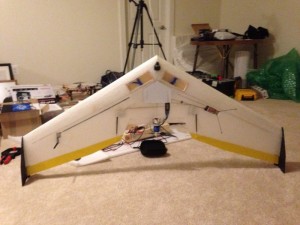 The TBS Zephyr
The TBS ZephyrTrappy: Yes, it was a TBS Zephyr. It weighs about 1.5 kilos. Of course if it hits someone directly with the body than the entire force would go towards that person. If it hits someone with the wings, the whole thing deflects. I've hit myself plenty of times with my foam body fixed wing and I am still around. It's not something you feel the next day and it's not like those quadcopters with spinning blades. All the motors and the dangerous equipment are as far back as possible for maximum protection.
DT: Ok, so what do you expect no to happen on the legal front, what's next?
Trappy: I can't really talk about our defense at this point. Right now, the case has only just started. I think it's still a cause worth fighting because now the question remains: what is reckless? I think if we can influence that decision, I think it would be a great benefit for everybody flying in the hobby. Also, maybe we can influence some ruling on the commercial side. Brendan Schulman has been fighting on a lot of different cases that are now pending before the DC circuit. So there are a lot of things to win from it and not much that the drone community can lose. I mean the only thing that's up for stake for anybody here is me and my ten thousand dollars.
Read More

